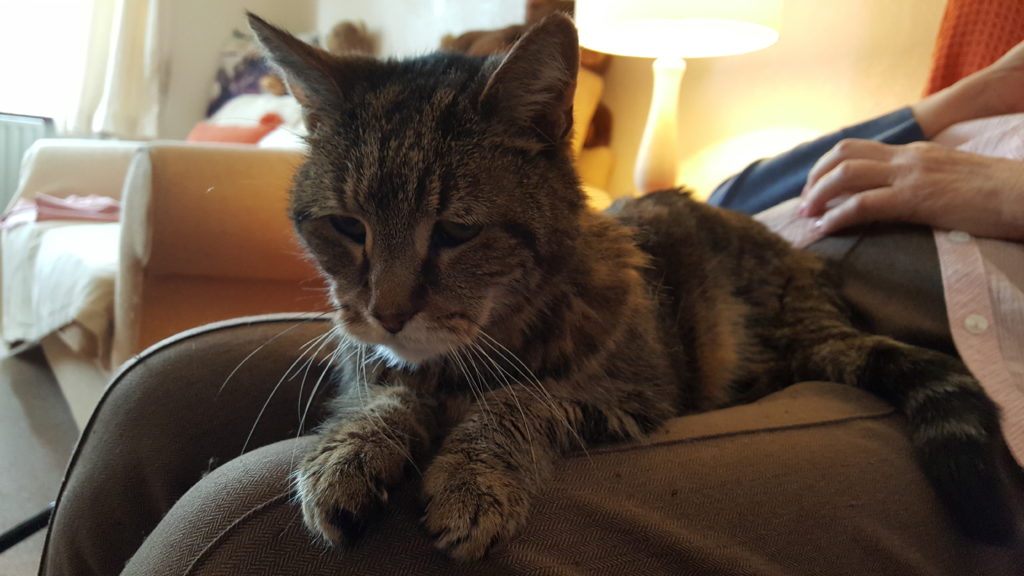
As the inevitable wear and tear of living a full life catches up with us, we’re generally pretty good at flagging up our aches and pains to our GP. It’s our loved ones however who will delicately point out when we are becoming increasingly forgetful or confused. Whereas in cats, their survival instinct requires hiding signs of vulnerability and this makes it a challenge when we’re worried that maybe not all is well with our golden oldie kitties at home.
Cats are living healthier and longer lives which is down to a combination of good diets, appreciation for and nurturing their natural instincts/behaviours and advances in veterinary care. As cats reach their senior years many will show signs of gradual decline in mental acuity (known as Feline Cognitive Dysfunction Syndrome (FCD) in veterinary lingo), so it’s important that we all, as adoring cat owners, keep an eye out for the signs.
What is FCD?
This is a progressive condition in senior cats affecting memory and ability to learn, resulting in altered behaviours which cannot be explained by a medical cause. FCD is seen in roughly a third of cats aged 11-14 and increasing to up to 90% of cats 16 years and over. Causes are still not well understood but are likely related to changes in the brain due to reduced blood flow, build-up of plaques, microhaemorrhages and heightened by stressful living environments.
What does it look like?
Early or mild signs are subtle and can include becoming increasingly needy/affectionate, less active or less interested in things they used to like and changes in their sleeping/waking habits. The more overt and severe signs include toileting “accidents” (house soiling), repeated yowling especially at night, asking for food when they’ve just eaten, aggression, anxiously pacing and looking lost and confused.
How is it diagnosed?
FCD is tricky to diagnose for a couple of reasons. First, and understandably, cat owners may feel these are normal signs of aging so may not raise it as a concern with their vet. Also, the majority of these symptoms can be very similar in presentation to common illnesses such as hyperthyroidism, high blood pressure, kidney disease, arthritis, urinary tract infection and a stressful home environment. Because there is significant overlap in symptoms, a diagnosis of FCD is usually given only after ruling out medical causes and stressors at home first.
Regular veterinary checkups are essential for senior cats to rule out diseases that may appear similar to FCD. New guidance advises twice yearly health checks for cats ages 11yrs and up and should ideally include a full exam, blood pressure check and blood and urine tests. If no other medical cause for the cat’s symptoms is found, a vet can then make a diagnosis of FCD.
Why does it matter?
Regular toileting “accidents”, pestering for food or disruption to sleep due to night time yowling will inevitably take its toll on you and your relationship with your cat, causing worry and wearing your patience thin. Understandably you may find it all overwhelming and incredibly frustrating and feel the urge to either punish your cat or push them away, but sadly this rarely helps the situation and often makes them even more stressed, causing them to continue or increase the unwanted behaviours. Equally your previously independent cat is now unsettled and confused and needs support to maintain a positive bond with you.
Thankfully it is possible to make home life a little easier on everyone and ensure their golden years are happy ones. So before you get to your wits end, do speak to your vet, vet nurse or qualified pet behaviourist about it and they would be more than happy to help.
What can we do about it?
There is no “cure” for FCD but making some small adjustments at home can help your cat feel more secure. Cats with cognitive dysfunction cope best in a calm environment so it’s important to avoid stressful events or making significant changes in your home if possible. A few useful tips include:
- Offering good access to everything they need all within very easy reach e.g. all on one floor and easy to spot from their vantage point (examples include raised food and water bowls, high and low covered sleeping areas, low lipped litter trays etc),
- Feed little and often using timed feeders to help them worry less about their next meal. Puzzle feeders and “snuffle mats” are also useful to keep them engaged and stimulated.
- Keep calming pheromone diffusers topped up in the rooms where they spend most of their time.
- Make time, separately, for relaxation by grooming them and stimulation by playing gently with them for short periods in the day.
- Use gentle play as a distraction if they appear confused or start to vocalise.
- Consider a night light at night time in the room that they sleep in.
- Minimise stressful interactions with other animals and people and always give your older cat the opportunity to be kept apart from them too.
More evidence is needed to determine whether specific supplements and medications can alleviate some of the symptoms of FCD but it’s definitely worth a chat with your vet to see what treatment options are available. FCD is not a life-shortening condition but it can directly affect their quality of life – the ultimate goal is to make the time you have together happy and comfortable. If you’re not sure you have got the balance right, your vet, vet nurse or pet behaviourist will always be available to give advice.

